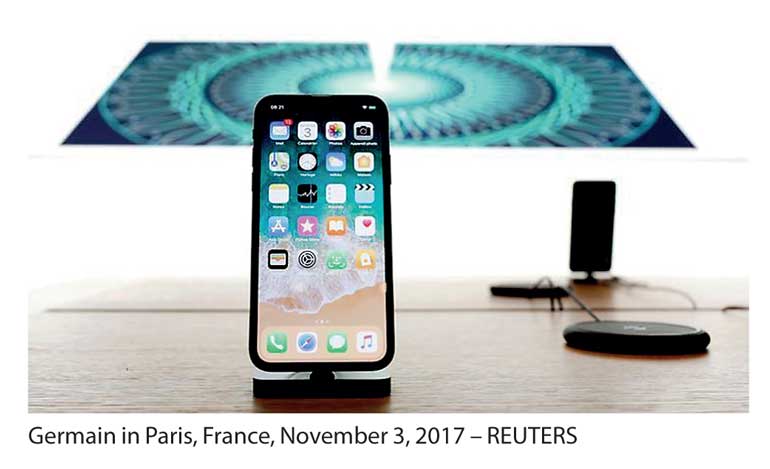Sunday Feb 15, 2026
Sunday Feb 15, 2026
Wednesday, 3 January 2018 00:00 - - {{hitsCtrl.values.hits}}
 SAN FRANCISCO (Reuters): In years past, demand for Apple Inc’s latest flagship phone was critical to the company’s results over the holiday shopping quarter.
SAN FRANCISCO (Reuters): In years past, demand for Apple Inc’s latest flagship phone was critical to the company’s results over the holiday shopping quarter.
That dynamic might be changing, however, as Apple’s widening lineup of devices and services more than makes up for any tepidness in demand this quarter for its lead product, the $999 iPhone X.
Last week, Apple’s stock fell 2.5% to $170.57 after Taiwan’s Economic Daily and several analysts suggested iPhone X sales in the fiscal first quarter would be 30 million units, 20 million fewer than initially planned by the company.
The cut in the forecast was not confirmed, and the stock regained ground on Thursday, hitting $171.82 by midday. The mean revenue estimate for the holiday quarter among 30 analysts remains at $86.2 billion, near the high end of Apple’s forecast of $84 billion to $87 billion.
Apple declined to comment.
Part of the support for Apple may reflect a change in its business strategy.
Releasing two new models and keeping older ones have made Apple less dependent on its flagship product. Apple shareholder Ross Gerber, chief executive of Gerber Kawasaki Wealth and Investment Management in Santa Monica, California, said the higher price and better margins on the iPhone X will reduce fears of a sales decline.
“We know that Apple’s strategy was different this quarter by releasing two phones, the iPhone 8 and the iPhone X, and I think combined sales will be in line with what people expect,” Gerber said.
Apple also has fattened its portfolio of accessories and other devices, from its AirPods wireless headphones to a new Apple Watch with cellular data features.
While none is a runaway hit, collectively they are an important contributor, with Apple’s “other products” segment growing 16% to $12.8 billion last year. Customers who buy those add-ons are also likely to buy services from the App Store and Apple Music, part of Apple’s services segment, which grew 23% to $29.9 billion last year.
“Ultimately, it will be this multi-device ownership” that will generate further revenue, said Carolina Milanesi, an analyst with Creative Strategies.
IPhone X sales still matter. Each unit generates nearly twice the revenue of an iPhone 7 and contains technologies like facial recognition that burnish Apple’s brand.
Bob O‘Donnell of TECHnalysis Research, said “hit products” still represent “an enormous amount of the company’s overall value.”
“Will it take hold in the mainstream? That’s the question that still remains,” he said.
PARIS (Reuters): Smartphone maker Apple and Japanese printer company Epson are facing legal complaints in France over allegedly speeding up the ageing process of their products to stimulate demand.
A French consumer association called “HOP” – standing for “Stop Planned Obsolescence” – filed preliminary, legal complaints in court against the two groups over the charges.
HOP said it filed its complaint against Apple in Paris last weej. A prosecutor opened an investigation into Epson last month, a judicial source said on Thursday, following a complaint filed in September by HOP in a court in the Paris suburb of Nanterre.
Laetitia Vasseur, co-founder of HOP, told Reuters the aim of both complaints was to apply the French consumer law, which was modified in 2015 to include the notion of planned obsolescence.
Apple is already facing lawsuits in the United States over accusations of having defrauded iPhone users by slowing down devices without warning to compensate for poor battery performance.
These lawsuits came after Apple said last week that operating system updates released since “last year” for the iPhone 6, iPhone 6s, iPhone SE and iPhone 7 included a feature “to smooth out” power supply from batteries that are cold, old or low on charge.
Phones without the adjustment would shut down abruptly because of a precaution designed to prevent components from getting fried, Apple said.
Under French law, companies risk fines of up to 5% of their annual sales for deliberately shortening the life of their products to spur demand to replace them.
A spokeswoman for Epson France said Epson denied the charges made against it by the HOP association. She added that Epson was working with authorities on the matter and that the quality of its products was of the utmost importance for the company.
Officials for Apple France could not be immediately reached for comment.